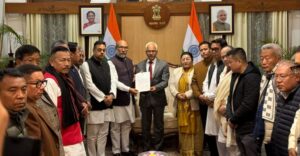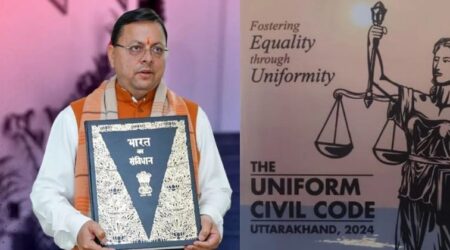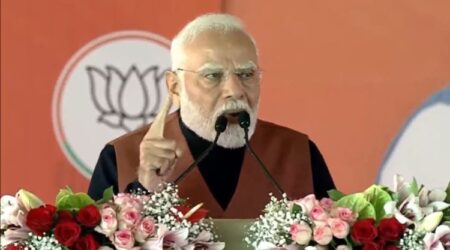10
Feb
What Leads to N Biren Singh’s Resignation as Manipur Chief Minister

After facing 21 months of opposition from Kuki-Zo leaders, declining popularity in the Meitei-dominated Imphal Valley, demands for resignation from the Opposition, and withdrawal of support by a key NDA ally, it was ultimately the pressure from discontented colleagues in the Valley that led to CM N Biren Singh resignation as Manipur Chief Minister on Sunday.
Kuki-Zo groups and 10 MLAs from their community—including seven BJP MLAs, two of whom were ministers—held Singh accountable for the ethnic conflict that erupted in the state on May 3, 2023.
Pressure from Colleagues Leads to CM N Biren Singh’s Resignation as Manipur Chief Minister
Discontent within Singh's own ranks began to surface last year and has since grown louder. BJP MLAs from the Valley have continuously approached the party’s central leadership, including the Prime Minister’s Office (PMO) in October 2024, seeking a change in leadership. However, the BJP leadership continued to support Singh.
The tipping point appeared to be the Budget session of the Manipur Assembly, set to begin Monday. With their pleas for a leadership change ignored, dissident MLAs prepared to take an "unprecedented and drastic move" during the session by supporting a no-confidence motion that the Congress was likely to propose.
As the rift between Singh's loyalists and the dissidents widened, the two groups began to camp separately by Sunday morning as the Assembly session approached, according to sources.
The wheels were set in motion when Speaker Thokchom Satyabrata Singh, a critic of the CM, visited New Delhi last week to meet BJP president J P Nadda. Satyabrata Singh reportedly informed Nadda about the no-confidence motion. When asked if the motion could be averted, the Speaker stated that he could not prevent it.
On February 3, Manipur Rural Development and Panchayati Raj Minister Yumnam Khemchand Singh, another known critic of Biren Singh, traveled to New Delhi. He allegedly warned the BJP leadership that the government would likely collapse if the CM was not replaced. Governor A K Bhalla met Union Home Minister Amit Shah on February 4 to brief him on the situation.
On February 5, Biren Singh traveled to New Delhi but, according to insiders, was unable to meet the Home Minister. Following this, he and some loyal ministers headed to the Kumbh Mela in Prayagraj.
Facing increasing pressure and the imminent Assembly session, Biren Singh flew to New Delhi again on Saturday. He met Shah and Nadda on Sunday, and after a two-hour discussion, it was decided that he would step down, sources said.
"Everything has a time, place, and situation. Yes, we have been pushing for this for long, but the MLAs decided not to wait any longer. We have the majority of the MLAs on our side, from the BJP, the NPF (Naga People’s Front), and the NPP (National People’s Party)," said one of the BJP MLAs who advocated for Biren Singh’s resignation. The NPP and the NPF are BJP allies.
BJP sources also mentioned that the Centre recently took steps to enhance border security and control the law and order situation. The appointment of Bhalla, a former Union Home Secretary, as Governor and a complete overhaul of the bureaucracy were part of these efforts.
"A no-confidence motion and the fall of the government would have derailed these attempts. The national leadership did not want these efforts to be overshadowed. The spectacular win in Delhi has just given them more confidence to take such a step," a BJP source said.
For the BJP leadership, the Supreme Court's request for a sealed-cover report from the Central Forensic Science Laboratory also raised questions about the viability of allowing the CM to continue, party sources stated. The laboratory is examining "leaked audio tapes" that allegedly implicate Biren Singh in fueling the ethnic conflict. Based on these tapes, the petitioner, Kuki Organization for Human Rights Trust, has called for an independent investigation into Singh's alleged role in the violence that resulted in over 200 deaths.
Even though the BJP leadership continued to support Biren Singh as CM, his leadership came to be viewed as a liability by his party colleagues who opposed him.
The erosion of trust in the state BJP government was evident in the previous year's Lok Sabha elections, when the NDA lost both seats in Manipur to the Congress. The growing discontent culminated in November when the homes of MLAs and ministers, including Biren Singh, were targeted and vandalized by angry mobs following the abduction and killing of six Meitei women and children.
At that time, NPP president Conrad Sangma announced that his party, which then had seven MLAs, would no longer support the Biren Singh government, specifically citing his "leadership failure".
To Check out more news and analysis: https://thelivepress.com/




